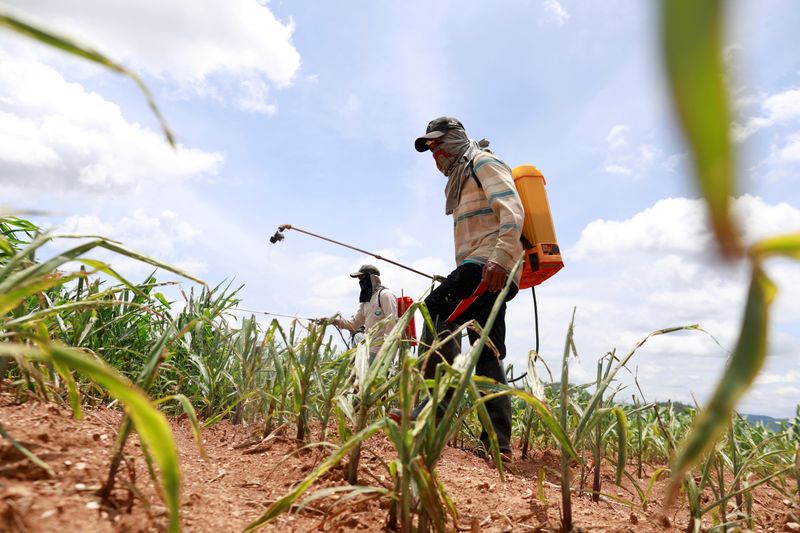 © Reuters. FILE PHOTO: Workers spray insecticide at a maize field destroyed by Fall Army Worm at Pak Chong district in Thailand
© Reuters. FILE PHOTO: Workers spray insecticide at a maize field destroyed by Fall Army Worm at Pak Chong district in ThailandBy Patpicha Tanakasempipat
BANGKOK (Reuters) – The United States and Brazil lodged separate protests with Thailand over its ban on two farm chemicals earlier this month, documents reviewed by Reuters show, saying the “restrictive” and “serious” move could hurt key agricultural exports.
Bangkok’s pesticide ban could hit U.S. and Brazilian exports of wheat and soy that are worth more than $1 billion a year, according to United Nations data, potentially setting up a diplomatic showdown with Thailand, a leading importer of the commodities from both countries.
The knock-on effect on Thailand’s food chain could also add tens of billions of dollars to costs while slashing millions of jobs, according to one Thai industry estimate.
Thailand added weedkiller paraquat and insecticide chlorpyrifos to its list of most hazardous substances on June 1, citing a need to protect human health. The move triggered another health regulation banning imported food products containing residues of prohibited chemicals.
The import ban has been drafted pending comments from interested parties up to July 18 and will become law once published in Thailand’s Royal Gazette. There is no apparent legal mechanism to derail the ban without first amending Thai health law.
The United States and Brazil challenged Thailand’s move in separate letters in late May after Thailand informed the World Trade Organization (WTO) of the pending import ban. Both the United States and Brazil suggested the Southeast Asian country lacked new scientific evidence, as required by the WTO Agreement on Sanitary and Phytosanitary Measures (SPS), to justify a measure that could restrict international trade.
“We have general concerns regarding the notified actions which appear to be more trade-restrictive than necessary,” Russ Nicely, Agricultural Counselor at the U.S. Embassy in Bangkok, wrote in a letter reviewed by Reuters.
Thailand imports nearly all of its soybeans from the United States and Brazil. In 2019, Thailand was the world’s eighth and fourth largest importer of U.S. and Brazilian soybeans, worth $525 million and $602 million, respectively, according to the United Nations Comtrade database.
Thailand, also the 10th largest market for U.S. wheat, uses millions of tonnes of both crops each year to produce a range of products from cooking oil, noodles, to animal feed.
The U.S. and Brazilian embassies in Thailand did not immediately comment.
BAN ‘DISREGARDS RISK ANALYSES’
Mananya Thaiset, a Thai deputy agriculture minister who championed Bangkok’s ban, has said the rationale is to protect human health at all costs. Mananya’s office declined to comment to Reuters for this story.
Paraquat, which has been linked to Parkinson’s Disease in various research, is banned in the European Union and China, while Brazil itself is also prohibiting its use later this year. Several studies have also linked chlorpyrifos, banned in Europe and U.S. state California, to impaired brain development in children.
But Brazil and the United States both urged Thailand to continue allowing imports of goods under Maximum Residue Limits (MRL) according to Codex, the international standards used for acceptable residue levels in traded food commodities.
Many countries that ban paraquat or chlorpyrifos domestically still allow imported foods under MRL standards.
“The Thai authority’s approach disregards risk analyses in the setting of regulatory measures that may have serious impact on trade,” said Brazil’s agriculture ministry, in a letter reviewed by Reuters defending the use of insecticide chlorpyrifos.
The latest tensions on farm chemicals come in the wake of a spat last year when the United States protested Thailand’s plan to ban glyphosate, used in Bayer AG (DE:)’s contentious weedkiller Roundup, the subject of many U.S. lawsuits claiming it causes cancer.
Thailand later backed down on glyphosate, but proceeded to ban the other two pesticides.
‘WE CAN’T CONTINUE’
Thailand would be one of few major markets for agricultural goods to impose zero tolerance on imports of commodities containing residues.
About 10 million Thai farming households are already facing up to the impact of the ban, especially on paraquat.
“Other chemicals are expensive and do far more damage to main crops than paraquat, while killing weed with less efficiency,” said Sarawut Rungmekarat, an agronomist at Kasetsart University in Bangkok.
Thai agribusinesses also argue the import ban would create ripple effects that disrupts the domestic food chain, from animal feed to livestock, fishery, food industries.
The import ban would cost Thai companies 1.7 trillion baht ($55 billion) and 12 million jobs, said the country’s Joint Standing Committee on Commerce, Industry and Banking, which urged Thailand’s prime minister to introduce a grace period until end-2021.
Thailand’s animal feed industry relies almost entirely on importing 5 million tonnes of soybean and 1 million tonnes of wheat per year.
“If you cut our supplies today, we simply can’t continue,” Pornsil Patchrintanakul, president of the Thai Feed Mill Association, told Reuters.
“If we fall, everyone falls with us.”




0 Comments:
Post a Comment